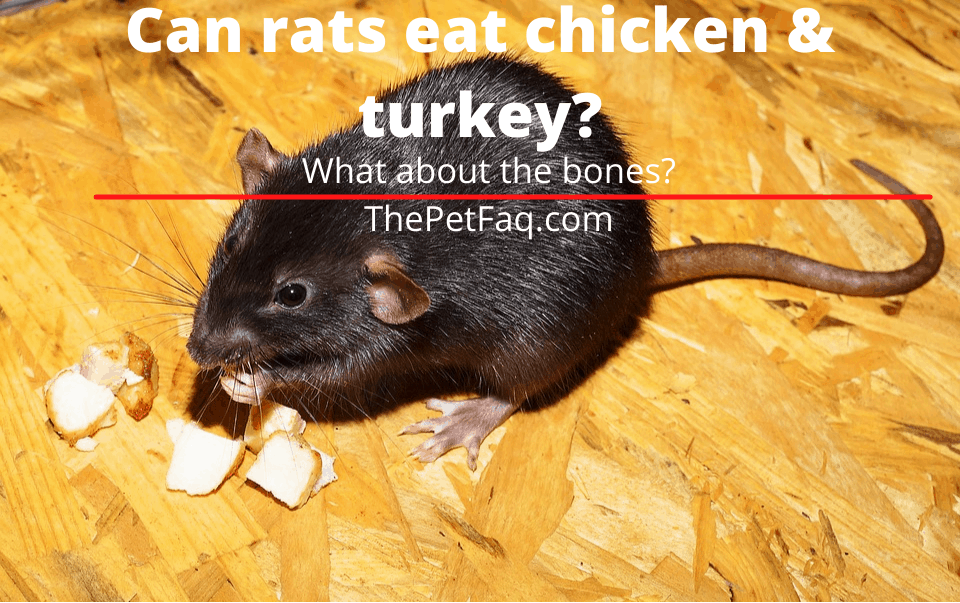Rats have a reputation for being able to eat just about anything – but can these intrepid critters handle something as festive and filling as turkey? As rat owners, it’s our job to fully understand our furry friends’ nutritional needs. So let’s take a deep dive into the world of rat diet and digestion to find out if rats can really eat turkey.
A Primer on Rat Diets
At their core, rats are omnivores, meaning they can eat both plant and animal matter Their natural diets consist of seeds, fruits, vegetables, nuts, insects, eggs, and small amounts of meat Domesticated rats have very similar nutritional requirements.
The bulk of a rat’s diet should be composed of high-quality rat pellets and lab blocks which provide balanced nutrition. This commercial food should be supplemented with healthy treats like vegetables, fruits, whole grains, and small amounts of animal proteins. Variety is key to keeping rats happy and healthy.
So where does turkey fit into this equation? Let’s take a closer look.
What Are the Benefits of Turkey for Rats?
Turkey meat is lean and provides an excellent source of protein. In fact 3 ounces of roasted turkey breast (without skin) contains around 25 grams of protein with minimal fat and very few carbohydrates.
Turkey is also rich in many micronutrients that are great for overall rat health:
- Niacin: Supports metabolic function
- Vitamin B6 & B12: Aid in enzyme production and red blood cell formation
- Phosphorus: Strengthens bones and teeth
- Zinc: Boosts immune system function
- Iron: Prevents anemia by improving oxygen circulation
In small quantities, turkey can be a nutritious supplemental protein for rats, adding valuable variety to their usual lab blocks.
Potential Downsides of Feeding Turkey to Rats
However, there are a few potential concerns with feeding too much turkey to rats:
-
Fat content: Darker turkey meat and skin may contain too much fat and grease for small rat digestive systems. This can lead to diarrhea or weight gain if overfed. Stick to lean roasted breast meat.
-
Bones: Turkey bones can easily splinter and cause choking hazards or internal injuries. Never feed bones.
-
Allergens: Some rats may have allergies or sensitivities to turkey. Start with tiny portions to see if any symptoms develop.
-
Richness: Too much turkey can potentially cause tummy upsets if rats aren’t used to digesting meat. Moderation is key.
Overall, turkey isn’t harmful if fed properly, but any new treat should be given in limited amounts at first. Watch for signs of allergies or digestive issues.
Feeding Guidelines for Turkey
When adding turkey to your rat’s menu, follow these tips:
-
Only offer skinless, boneless, roasted turkey breast. Avoid wings, legs, skin, or ground turkey which have more fat.
-
Limit turkey treats to a few small bites 1-2 times per week at most. Pieces should be no bigger than the size of your rat’s head.
-
Introduce turkey slowly and in tiny amounts at first to avoid upsetting sensitive digestive systems. Mix it into their lab blocks.
-
Never feed raw or undercooked turkey due to bacteria risks. Make sure any leftovers are thoroughly heated.
-
Avoid turkey deli meats and seasoned turkey products – stick to plain roasted meat.
-
Monitor your rat’s droppings and watch for soft stools or diarrhea, which indicates too much turkey.
-
If any signs of allergic reaction or tummy upset occur, discontinue feeding turkey immediately.
Other Healthy Protein Options for Rats
For rats that don’t tolerate turkey well, there are other lean protein options to try instead:
-
Chicken: An excellent alternative white meat. Remove all bones first.
-
Eggs: Scrambled or hard-boiled eggs make great treats.
-
Cottage Cheese: A good dairy source of protein.
-
Salmon: Cooked salmon provides healthy omega-3s.
-
Beans: Kidney and black beans add plant-based protein.
Aim for variety and moderation when offering rats new protein sources. Track their response to identify any foods that don’t agree with them.
The Verdict on Turkey for Rats
Overall, turkey can be a healthy supplemental protein for rats when fed properly. In moderation, it provides extra protein, vitamins, minerals, and valuable variety. However, excessive fat, bones, seasoning, or amount can cause health issues. Stick to boneless roasted breast in limited quantities.
Get to know your rat’s unique tastes and tolerances. Then feel free to mix some festive turkey into their usual balanced diet. But be sure to keep an eye out for any signs of tummy trouble or allergic reactions. With some care and common sense, your rats can join in the Thanksgiving turkey fun!

Explore Gift-Giving The Rat Way
While gifts aren’t necessary, I do enjoy spoiling my rats with new things for their cage. I often try to get at least one new item my rats have never experienced before. I’m a big believer in changing things up in their environment to help keep rattie minds sharp.
Options for changes include: a shelf/level addition for the cage, a food puzzle, a foraging toy, a digging box, or a ferret tube. I also take this opportunity to replace chewed up hammocks and bedding. I like to support small businesses and hammock makers during this time of the year.
If your rats don’t need any new items, but you still want to do something special, consider donating to a rat rescue in their name!
Spoil Your Rats With Food, Glorious Food!

Whether you’re preparing for Thanksgiving, Hanukkah, Christmas, Kwanzaa, winter solstice, or any other type of observance, the quickest way to win favor with your rats is through their bellies.
Generally, rats can eat some of the same healthy foods we do. Educate yourself about potentially unsafe foods for rats, and consult your veterinarian for any concerns specific to your rat.
For example, sweet potatoes, bulk tofu, dry beans, and peanuts should never be given raw. Green potato skins and eyes, poppy seeds, dried corn (fresh is fine), or any type of nut that has gone bad or contains mold should be avoided. Celery, beets, and spinach should be fed with caution, or in moderation. For more in-depth information, and a full list of foods to be wary of, one reference is the Rat Fan Club diet page.
Rats should receive fresh fruits and vegetables every day anyway, so you can easily integrate some of your holiday feast into their daily diet. The main things to remember are: moderation and portion size. Avoid offering your rats any vegetables, fruits, or meats that are “enhanced” with seasonings, spices, sweets, etc. As you cook, set aside the healthiest ingredients for your rats before all the extras are added.
When it comes to desserts, offer your rat kiddos a little smidgen of the sweets — a tiny indulgence every now and then won’t hurt otherwise healthy rats. Just don’t make it a regular habit, and be sure to factor in any other snacks they’ve had that day. Also, avoid anything made with artificial sweeteners. Rats generally don’t like them, and these sweeteners aren’t good for rats.
If you don’t feed your rats a vegetarian diet, then samplings of turkey, chicken, giblets, and fish would also be welcomed. However, avoid ham or anything else that is particularly high in sodium.
Do not allow your rats a sip of your adult beverages! Avoid giving them any fizzy drinks, as well. Rats do no have the physical ability to burp or vomit, and carbonation can cause an upset stomach.
Surviving on RATS: This Mekong Village Makes Millions from Rats
FAQ
Can I feed my rats meat?
What foods can rats not eat?
Can rats eat poultry?
Can rats have cooked turkey bones?
Can rats eat rat food?
Of course, pet stores and most large store chains carry rat food, which is fine for feeding your rat. However, sometimes you may want to give your rat a snack or feed him or her what you’re feeding your family that night. In that case, it is important to research to make sure that the food is safe for your rat.
Can one have turkey and carrots?
Eating turkey and carrots is part of healthy habits. The turkey has meat like chicken and is another healthy poultry option. Carrots are rich in carotenoids, it is a source of vitamin A, fiber, potassium and vitamin B3.
Can rats eat meat if they eat chicken?
Lean meats such as chicken, turkey, and lean cuts of beef are excellent sources of protein for rats. It is important to ensure that the meat is cooked thoroughly to avoid any risk of bacterial contamination. Cooking the meat also helps to remove excess fat, which can be harmful to rats if consumed in large quantities.
Can a rat eat organ meat?
Organ meats, such as liver and kidneys, can be included in a rat’s diet but should be given in moderation. These meats are rich in nutrients like vitamins A and B12, but they are also high in cholesterol. Excessive consumption of organ meats can lead to weight gain and other health issues.
